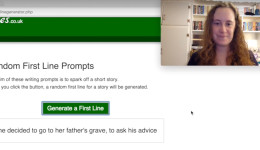Get Thee a Writing Community
When the clock struck 12 am, NaNoWriMo officially came to an end. Even though I “rebelled” a bit this month with that agent submission, I managed to write 50,000 words and won. Yay me!
Giving would-be authors an incentivized deadline is one of the great gifts of NaNo, but for me, it’s not the most important one. I treasure the community of NaNo above all else: the write-ins, the camaraderie, the “being in the trenches” with fellow writers who are on the same journey I am. That’s why it’s so important to use NaNo, or any other gathering or conference, to cultivate your own writing community for the long haul.
My writing community doesn’t always consist of people who all meet up together: oftentimes our schedules vary or certain people don’t live nearby. My community doesn’t even consist of everyone knowing each other, or even living in the same place (word sprinting over Skype is fantastic). They don’t all share my genre or writing temperament, but I’ve discovered that it’s important to have diversity in your group.
Here are a few personalities I see in my community, most of whom inhabit more than one of these traits:
The Mentor
The Mentor is a writer who is where you want to be, who can guide you through your difficult path, hopefully shortening the journey and mistakes because they pioneered through first. This person is a cheerleader, a coach, a sounding board, an editor, an accountability partner, and a teacher all in one. You may have to pay for this—my Mentor is my writing coach Kevin T. Johns—but the Mentor’s impact on your writing life will be second to none. My life changed when I stumbled upon a free webinar Kevin offered, which later led me to hiring him as a coach. I would not be where I am today without him. My book would not be where it is today.
This isn’t to say you can’t succeed without the Mentor. You can. But if you can succeed faster, with less struggle? If your book has a professional guiding its creation? Both you and your book will be better for it.
The Pro
This person is much like the Mentor, only his skills are much more specific. Perhaps you are clueless about social media and marketing, and you have a person in your group who excels at that. Perhaps you decide to self-publish, and someone has already learned those particular ropes. Learn from these people (but make sure you’re giving just as much back in return, in areas that you excel at). While the Mentor may be a professional coach or published author—often requiring remuneration for services—the Pro is someone in your personal group who you can trade services with.
The Carbon Copy
The Carbon Copy is the person who understands you, your work habits, and your book in ways that no one else can, because in many ways they ARE you. This person shares your brain, and your books explore similar themes and concepts because you have similar worldviews. The Carbon Copy is invaluable because she will be able to express in words that which you cannot. You are too close to your own story sometimes. This person has distance with your viewpoint. It’s a magical partnership. She will also be a terrific sounding board for new ideas, and may even offer up some of her own, that pair beautifully with the story you are trying to tell. She will just “get” it.
Treasure this person, if you are able to find her. Carbon copies are rare and magical creatures. What she does for you, you will be able to do right back for her, and eventually you won’t know how you ever managed to write a word without her encouragement and support.
The Complementer
The Complementer is the person who may write in your genre but not your category (age range), has your worldview but not your temperament, or has knowledge and/or skills that fill out the holes in your own experience. In short, this person complements you and your story. You are able to get great feedback from someone who understands your field but isn’t directly competitive with it. He may have insight into themes or marketing that you touch upon but don’t know much about (say, if you’re trying to reach the student market and you have teacher friends in your desired age range). This person is wonderful at expanding points of your story that otherwise may not have reached their full potential.
The Supporter
The Supporter may not write in your genre, have your outlook, or even be able to give you the type of writing advice or critique you’re looking for, but that doesn’t mean that she’s not valuable. She may provide the best encouragement, may be more available to meet up for write-ins, and/or may be someone who provides the non-writerly advice advice that you need. If you ever only have writers look at your work (or writers of your same temperament as you), then you’ll never know how your work stands up to readers of all kinds. This person can provide you with valuable insights you’ve never even thought of because she is working in a genre or style wholly different from your own.
The Unsung Heroes
Perhaps the most important and least-regarded of the writing community are the Unsung Heroes. These people are those who are not writers themselves. They do not go with you to write-ins. They do not participate in your latest discussion on publishing trends. They cannot critique your work or give craft advice on how to make it better. These are your family and your significant others. They are just as valuable as your actual writing group, because without their support, you may not have the ability to write at all.
I know that, during the fervor of NaNo, my husband goes a little bit crazy. I’m not always around to talk about his day, or keep up with the dishes, or do the laundry (as an example—I don’t ever really do laundry. The washer and dryer are in the scary, often-buggy part of the basement). During this past month, when I had a tremendously difficult deadline to meet, he was at my beck and call, bringing me food, filling my water, surrounding me with silly stuffed animals for support. He did that all without asking, because he is wonderful and knows what I need (and I do the same for him during his own pressured times). Dealing with my craziness is what he signed up for when he married a writer. He and other family members who support and encourage me though they don’t partake in or truly understand the journey themselves are invaluable to my success.
Now, people write successfully without communities and without people supporting them all the time. I’m just speaking for me. I thrive on having people to share my journey with, to bounce ideas off of, to get perspective on my writing and my worlds. I yearn for the times of generations past where writers had professional circles and visited each other for weeks or months at a time, sharing ideas, thoughts, and work (such as the Transcendental Club). True “meetings of the minds.”
We live in a world that is both too invasive and too private. Technology allows us to casually interact with people all over the globe, but cultivating meaningful relationships has become much harder. It’s believed that friendships only form through repeated, shared activity, and that is difficult to accomplish in our busy adult lives. NaNoWriMo provides this through offering local write-ins, and—if you’re lucky enough—you’ll find a few gems in the mix of writers who become part of your writing support team for the months and years ahead.
Whether or not my personal writing community will stand the test of time remains to be seen, though they have lasted through this whole past year (met them during NaNo 2014). For now, I’m enjoying the moments, the camaraderie, and the support they so freely give. I hope I provide the same level of encouragement to them.
Shout-out to my writing peeps on Twitter: Angie Anomalous, Audra Atoche, Alicia Byers, Hillary DePiano, Kevin T. Johns, Taina R. Patmore, Lisa Rosen, Jen Russ





